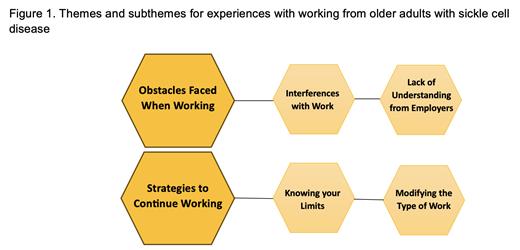Introduction
With medical advancements over the past decades, the life expectancy for people with sickle cell disease (SCD) is longer than ever before. As they age, people with SCD acquire both SCD-complications and age-related comorbidities that lead to premature functional impairment, requiring individuals to make complex decisions that affect their work and career ambitions. There is a gap in the literature on work experiences in older adults with SCD. The purpose of this study is to describe the work experiences of older adults with SCD.
Methods
We enrolled 19 older adults with SCD (age ≥ 50) from a comprehensive sickle cell center. We conducted semi-structured interviews by phone and in-person. Participants were asked open-ended questions about their experiences living with SCD and their single biggest problem faced with having SCD. Participants described obstacles faced when working and strategies to continue working as older adults living with SCD. Audio-recorded interviews were transcribed verbatim. Conventional content analysis was used to analyze the transcripts.
Results
The mean age of participants was 58 years (range 50-71) and 47% were women. Nearly half were externally employed (47%), 5% unemployed, 11% retired, 32% disabled, and 5% self-employed. Only 21% had a high school education or less, 37% completed some college, associates, or technical school, 26% had a bachelor's degree, and 16% had an advanced degree. For household income, 37% earned ≤ $30,000, 16% earned $30,001-$50,000, and 42% earned > $50,001. The majority were the head of their household (53%) and 21% reported living alone. Within the last 6 months, 32% were hospitalized and 26% missed at least a day of work due to a pain crisis. Most participants (53%) had HbSS genotype, 37% had HbSC, and 11% had HbSβ+-thalassemia.
There were two major work-related themes that emerged from the interviews (Figure 1).
Theme 1 was “ Obstacles faced when working ”, which centered around interferences with work. Participants discussed the physical limitations, SCD-related complications, lack of energy to perform job tasks, and pain crises that would interfere with their work schedule and sometimes keep them out of work for years.
Participants described concerns about being forced to retire early or give up their business due to health-related issues. Many described challenges with work as the single-biggest problem they faced as an older adult with SCD.
Participants also described obstacles related to a lack of understanding from their employers. They described getting sick and staying in the hospital for days at a time, then being expected to return to work immediately after discharge. One participant described sharing their disease diagnosis with an employer and being discriminated against working that kind of job.
Theme 2 was “Strategies to continue working”, which centered around participants knowing their limits and modifying the type of work they did. Participants described learning to listen to their body when it has reached its limit, knowing when to back away and come back to job responsibilities, and knowing when to take breaks.
Participants also described the importance of finding accommodating employers who were understanding of when they had to miss work.
Some participants described how they had to learn new skills to do alternative, more flexible jobs that were not as physically taxing on their body, such as working from home, starting a business, or becoming a real estate agent. They especially emphasized the importance of being aware of how far they could go with certain jobs to avoid triggering pain crises. Participants also described going through periods of temporary disability or retirement, then getting a new job and slowly working their way up from part-time to full-time.
Conclusion
Older adults with SCD provided insight into the unique obstacles they faced while working and described work-related challenges as the single biggest problem they faced. Moreover, many described the strategies they developed over time and accommodations that allowed them to continue working or re-enter the workforce. Data provided from these experiences convey the dire need for policymakers and employers to support accommodations needed by adults with SCD to continue working. This information will help guide younger adults with SCD to better navigate the working world and achieve their ambitions as they advance in age.
Disclosures
Strouse:Agios, Takeda, Disc Medicine: Consultancy, Research Funding.


This feature is available to Subscribers Only
Sign In or Create an Account Close Modal